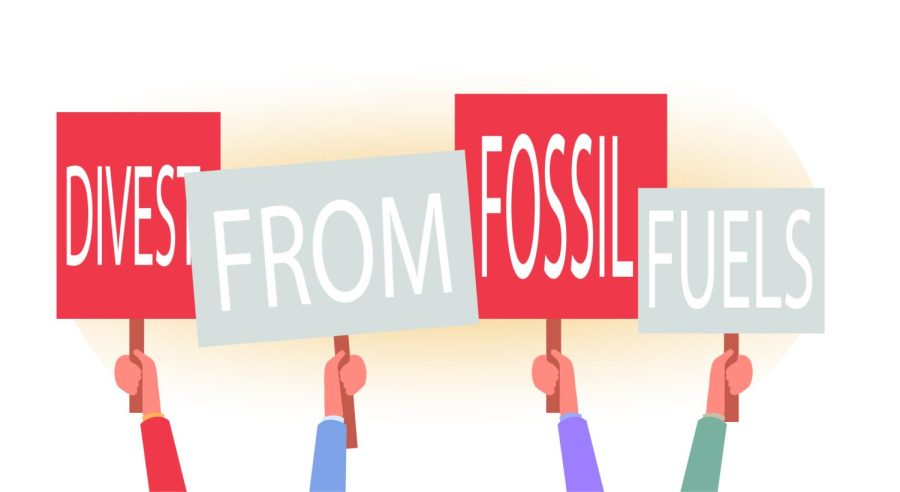Students urge WSU Foundation, administration to divest from fossil fuel companies
Retired professor, WSU alum spoke to Board of Regents about investing in companies with green, renewable energy
Environmental Sustainability Alliance is calling on WSU to divest from 200 companies with the highest global ranking of carbon reserves.
February 8, 2022
WSU’s Environmental Sustainability Alliance is calling for WSU to divest its endowment funds from fossil fuel companies as an effort to combat climate change.
Endowment funds contain donated financial assets, which the WSU Foundation uses to invest and collect from. These funds are then used for the benefit of WSU, according to the WSU Foundation website.
ESA is asking WSU to divest from the so-called “carbon underground 200,” the 100 public coal and 100 public oil and natural gas companies globally ranked by the size of their carbon reserves, and to invest, instead, in companies providing green, renewable energy, said retired professor William Engels.
Engels and WSU alum Simon Smith first brought the issue to the Board of Regents on Sept. 17, 2021.
Last fall, Engels presented to ESA about the reasons for a divestment campaign at WSU. Ever since, he has worked alongside the student organization on this issue, and ESA has commented at every Board of Regents meeting.
“We are not asking the university to make a sacrifice that’s going to jeopardize the financial well-being of the institution. In fact, it will make it more secure,” Engels said.
Other nations, countries and institutions have shifted toward alternative energy sources, creating an uncertain future for fossil fuels. Because of this, fossil fuel companies are no longer a secure investment, Engels said.
If WSU does not take action, sooner or later they will be burdened with stranded or devalued assets. A properly managed shift of investments from fossil fuels to clean energy is the financially responsible thing to do, Engels said.
Divestment chips away at the political power of fossil fuel companies, holding them accountable for their unregulated carbon pollution, according to a step-by-step guide on divestment from the Global Fossil Fuel Divestment Commitments Database.
“As we all know, the biggest offenders and contributors to climate change are not us, but the big companies, those fossil fuel companies that are drilling for oil and coal,” said ESA Chair Stevie Fawcett.
The biggest impact students can make is to put pressure on a big player like WSU to take money away from that industry, Fawcett said.
“It costs millions of dollars to do other sustainability projects, and it’d be hard to get the funding for that. It’d be hard to convince WSU that that would be a worthwhile project,” Fawcett said. “However, we’ve seen multiple institutions do this — fossil fuel divestment is super common.”
There are many examples of other institutions that have done this successfully, including Harvard University, Oregon State University and Seattle University, Engels said.
Worldwide, there are more than 1,500 institutions that have committed to some level of divestment, according to the Global Fossil Fuel Divestment Commitments Database.
“It’s a really big opportunity to make a large impact on a global scale, for what I consider to be the biggest problem in the world right now,” Fawcett said.
There is also support from faculty, students and other organizations on this issue. In a survey ESA sent out in November 2021, 70% of 1,051 students who responded agreed that WSU should divest from fossil fuels.
Students have the power, Fawcett said. Issues like climate change and fossil fuel divestment seem daunting, but in reality, the majority holds power.
“We actually have a plan, it’s not just a complaint that we’re filing to WSU. We have a really big opportunity here — can we take advantage of it?” Fawcett said.
ESA has received limited communication from the Board of Regents on this issue, although the board has confirmed that some fossil fuel investments are included in the endowment holdings, Engels said.
ESA was also told there had been no conversation on the topic before the issue was brought to the board last fall, he said.
At a Board of Regents committee meeting on Jan. 20, WSU Foundation CEO Mike Connell presented on the status of fossil fuel divestment, as well as its connection to Environmental, Social and Governance investment.
ESG investment strategies involve considering non-financial factors in investment companies, according to the CFA Institute.
ESG investing is an ongoing effort for the investment committee, which is charged with investing both foundation and university assets that are endowed, Connell said.
“People need to know we are working on not just the immediacy of fossil fuels, but a longer-term set of goals and objectives,” WSU President Kirk Schulz said in the committee meeting.
Currently, ESA is planning on creating two petitions, one for students and another for local organizations. They hope to make these available soon and present the results to the WSU administration, ESA Treasurer Ryan Culp said.
They advise students to look for the online petition as well as the display table on the petition in the Compton Union Building, Engels said.
ESA encourages students and organizations to join them to spread the word as they campaign to free WSU from fossil fuels.
“I would highly, highly encourage students who care even a little bit about these issues to get involved … because you definitely have the power, you can make a huge difference,” Fawcett said.
ESA meets at 5:30 p.m. every other Tuesday in CUB room 206. Their next meeting is Feb. 15. The biggest thing students can do is to come to those meetings and get involved, Fawcett said. ESA can also be contacted at aswsu.edu@wsu.edu.










